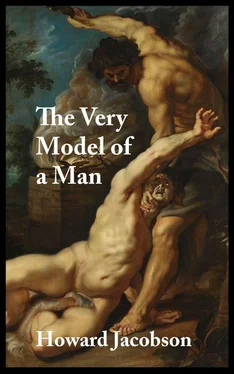In this way do the heavy in spirits wreak their terrible revenge on the light.
It is a law as immutable as gravity. And it was devised by the same Heavy Hand. Whatever is dark draws brightness into it. Wherever the lugubrious gather, there you will find the frivolous dancing their hearts out for a sign of favour. I am a jealous God, said the Lord, and what I am above all jealous of is your gaiety. You will therefore expend the lightness of your hearts in My heavy service.
So it was; so Saraqael dropped like a stone to remind us it should be; so it still is.
Light? Us?
These things are relative. Had you seen my father skipping to the high places with buckets of dung and slush slung over his shoulders, the wherewithal to build altars to the exact specifications laid down by Saraqael, you would have said, There goes an alacrious man.
Had you seen my mother sifting flour and beating oil — a tenth deal of one for every quarter hin of the other — you might have thought, now that is a willing woman.
And had you seen my little brother sorting through his flock, separating those without spot from those with spot, divorcing those with blemish from those without blemish, inclining his golden head to be certain he understood the angel’s words — ‘Then shalt thou kill the ram, and take of his blood, and put it upon the tip of thy right ear, and upon the thumb of thy right hand, and upon the great toe of thy right foot’; had you beheld the concentration in his wandering eyes as he took the fat that covereth the inwards, and the caul that is above the liver, and the two kidneys, and the fat that is upon them; had you watched the slow, sensuous movement of his fingers, the caressing of the carcass, the obedient washing and cutting and sprinkling round about, that family look of low triumph disfiguring his lips, parting them so that the white of his teeth might do something to touch the heart or tickle open the pinions of Saraqael; had you taken in the sudden starts of astonishment he managed, the seizures of amazed fleshly disquiet, whenever he caught the gaze of the blazing black angel fixed upon him, the blazing blond boy; had you beheld his shivering suspense, his tantalising trepidation, his compliant palpitating passivity, promising everything, everything, even unto hell — then, then might you have taken a stone to him yourself, long before I did.
And this is to say nothing on the subject of the commotion he raised when it came time for circumcision. Perhaps I should say nothing. I am mindful that I am addressing an audience — at least that part of which is male — renowned for the erectness of its carriage and for wearing its foreskins with a pride bordering on fervour. I have not forgotten I am in Babel. I have my own feelings to consider. I will not willingly expose myself to ridicule. Suffice it to say that when the moment came and I found myself unable to budge the angel from his appointed course, I took the sharpened flint from him, bundled the medicaments in a pouch, refused the good wishes of my parents who not only approved this barbarism but actually seemed to be exhilarated by it, and set out for the consoling privacy of my garden where, attending promptly to my own amputation, I was able to bleed in peace, and I like to think with dignity, among my flaming amaryllids.
My brother, on the other hand, was unwilling to settle for anything less than a universal assistance — I use the word in its double sense of both attendance and instrumentality. We all had to be there and we all had to help. I except, as I then excepted, myself. What need of me when there was an angel of the Lord to give instructions, and the first of all fathers to wield the blade, and the first of all mothers to whisper comfort?
He howled for all that. Then he fainted. Then he howled again. Then my mother fainted. Then my father howled. Then even the blazing angel changed colour.
Stimulated by the spectacle, the Lord Himself spake — the first words He had spoken unto us since my father had stepped between Him and my mother. ‘This day,’ He said, ‘have I rolled away from you the reproach of —’
But amidst all the fainting and the howling it was impossible to hear Him. And to this hour I do not know what reproach was rolled from me along with my prepuce.
A third thing went as a consequence of Saraqael’s visit. The regard in which I held my family.
I do not say love. Love, I suspect, cannot go. It might suffer adulteration with baser passions, might shrink or warp or seek concealment, but, like a birthmark, like a stone that crystallises in the bladder that hoards bile, like bile itself, it never leaves your body.
Regard, though, survives only by the grace of judgement. It is contingent and temporary. A mark awarded for performance. And in its dealings with Saraqael, the angel of the personal enigma, my family performed poorly.
For a start, we — I mean they, but accept collective responsibility — we set too great a store by his name. We couldn’t stop using it. Saraqael — it wound around our tongues and wouldn’t let us speak without it.
Saraqael, my mother said, has just informed me — haven’t you, Saraqael? — that he will not be with us many more days. I’ve told Saraqael I don’t know how we’ll manage without him.
Him? I said. Who’s him?
Saraqael.
It hadn’t been so with Semyaza. Then my mother was the one sought, not the one seeking. She was younger. Mud clung to her breasts. She had not drunk of the waters of bitterness. Was not using an angel’s name to settle scores with a mortal. And Semyaza himself had not been a guessing game. Throwing himself away — that had been his idea of fulfilment. Falling out of the sky. Coming apart in your hands. I don’t know how these things are judged in heaven — erroneously, though, you can be sure — but in my opinion this makes, this made, Semyaza the better angel. Self-hoarders like Saraqael set a miserable example. Only the prodigal are Godly. But does God know that?
Does God, in that sense — in the sense of being able to gauge how a spirituous value will look when it has flesh on it — know anything? It is a time-consuming business, keeping an eye on two worlds. And requires an intellectual flexibility, a capacity for agile mental dualism, which a God who by His own admission is unusually and irreversibly jealous, that is to say self-fixated, cannot fairly be expected to possess. Jealousy floods the system. It does not merely poison the mind, it confuses it with that which is not mind. It passes off electrical impulses as cogitation, the opening and closing of arterial valves as introspection, the sluicing of the heart as philosophy. Whoever heard of a jealous man who was capable of judgement? Or a jealous god?
Or a jealous brother?
I was envious, as I have not tried to conceal, and envy is not jealousy. Its greater coldness makes it more the friend of reason. I have heard it said, though I stop a little short of this myself, that envy is so far reasonable that it is a species of irrationalism not to suffer it. That envy is nothing other than a calibration, measured on the meter which is oneself, of the inequity of the world. And is therefore scientific.
Which is a claim I am at least prepared to make for the disgust I felt — no, the disgust I mensurated — in the company of the angel. He coaxed his name out of my mother, and then regarded her, in a slow unblinking stare, with the most absolute contempt. With my father, who was no less anxious to please, who in truth believed he had been pinched out of earth for no reason other than to please, he was more imperious still, not even bothering to pretend to smile when my father attempted innocuous sallies of humour, or tried to engage him in the man-to-man banter his heart yearned for, or threw up the occasional altar to his own designs, a sportive folly the height of a hundred angels.
Читать дальше











